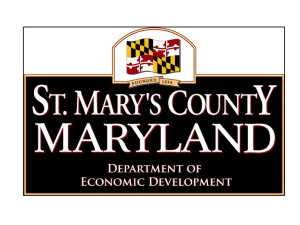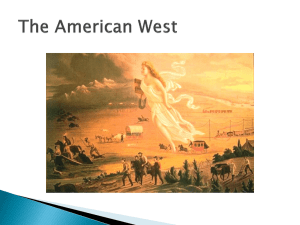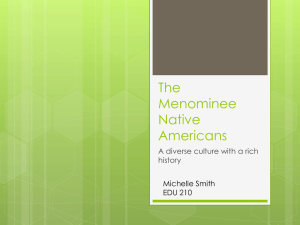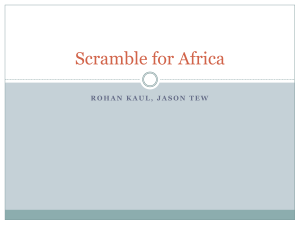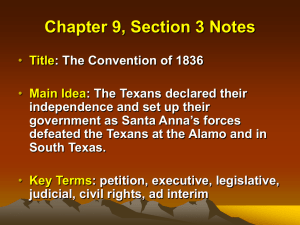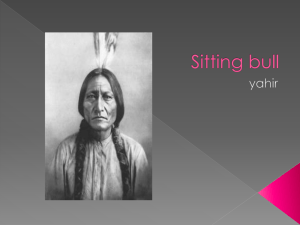Land in federal “trust”
advertisement
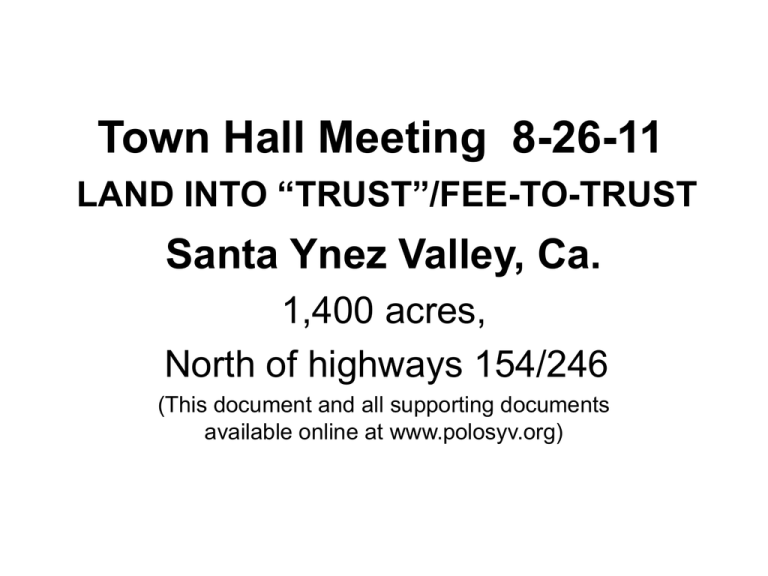
Town Hall Meeting 8-26-11 LAND INTO “TRUST”/FEE-TO-TRUST Santa Ynez Valley, Ca. 1,400 acres, North of highways 154/246 (This document and all supporting documents available online at www.polosyv.org) Santa Ynez Band of Mission Indians(Chumash Casino), purchase of land and development • The Santa Ynez Band of Mission Indians has every right to purchase property, and to develop that property through established County and State processes. • The issue is land into trust - the exponential negative impacts created by taking land out of County and State jurisdiction and the Comprehensive and Community Plans, and into federal “trust.” Draft “Cooperative Agreement” presented 6/1/11 by the Santa Ynez Band of Mission Indians (Chumash) to Santa Barbara County CEO • From the “Agreement:” “The County shall support the fee-to-trust annexation of the Property to the Reservation by federal legislation, the administrative process by federal agencies or any other possible way in existence now or in the future. Upon request of the Tribe, the County shall confirm such support by letter or resolution.” Draft “Cooperative Agreement” presented 6/1/11 by the Santa Ynez Band of Mission Indians (Chumash) to Santa Barbara County CEO • Included in “Agreement”: • “Whereas, the Tribe desires to expand Tribal housing opportunities and operate Tribal economic development projects in a manner that benefits the Tribe, its members, and the community as a whole, and the County recognizes the mutual benefit that can be derived if those goals are achieved” Santa Ynez Band of Mission Indians • Are ALLOWED TWO CASINOS PER THEIR GAMING COMPACT “Fee-to-trust”, Land in “Trust” What does it mean if land goes into federal “trust”? What are the consequences when land is in “trust”? • Land into Trust is a real estate transaction which converts land from private or individual (fee) title to federal title. Once the process is complete, the subject land will belong to the United States of America. The land is then placed under the control of an Indian tribal government with the United States Government acting as a fuduciary. (http://www.citizensalliance.org/) • The fee to trust process provides tribes with some very important benefits not available to other US citizens. By converting the land to federal ownership (title), the land becomes exempt from state and local government taxes and local land use regulations. In most states, trust lands are removed from local law enforcement jurisdictions as well. Avoiding the jurisdiction of local and state governments is the primary reason Indian tribes apply to the Bureau of Indians affairs to convert fee land into federal trust title. (http://www.citizensalliance.org/) • Federal regulations require local communities to provide fire protection, road maintenance and other municipal services to these trust lands despite the fact the trust land is immune from property taxes, building codes and property regulations. Most communities will find federal trust land will create additional expenses while reducing their tax base. Trust lands will likely create jurisdictional disputes in law enforcement, land use planning, social service delivery and emergency services. Most communities dealing with federal trust conversions have had found the process disruptive and divisive. (http://www.citizensalliance.org/) Examples of disruption and problems in other communities: • Banning city: Morongo tribe erected a guard house blocking a county road to the land owner’s private property, delaying his passage and ability to develop his property. • Colorado River: Tribes claiming land along river threatening owners and may be causing property damage to private property. • Riverside County: Tribe purchased property around a community of homeowners with threats to owners’ ingress and egress.. The beginning of the Santa Ynez Band of Mission Indian (Chumash Casino) expansion, Year: 2000, the “6.9” • In 2000, the Santa Ynez Band of Mission Indians (“Chumash”) applied to take 6.9 acres across from their casino into federal trust. • The County and community members were very concerned that there would be substantial negative impacts if this 6.9 acres was taken into trust. In 2004, the Bureau of Indian Affairs accepted the land into trust. • The County attempted a “Historic Agreement” and gave up its right to appeal. “The 6.9, continued” The “Historic Agreement” fell through and the County missed its opportunity to appeal. Initially, four citizen groups appealed the BIA decision. P.O.L.O. and POSY continued in the litigation process and achieved precedent setting “standing” for our community. Standing enables our community to challenge the BIA’s decisions. Our last filing was over a year ago and the BIA will not tell us when they will be answering our challenges. Why did the Citizen Groups file litigation against the Federal Government (BIA)? • These community members knew that the 6.9 was the beginning of a “blueprint for expansion” that other casino tribes were doing all across the United States. Casino tribes, using their hundreds of millions of dollars of gambling profits, were buying up communities and turning them into casino towns. There will be serious harm to our community if the 1,400 acres goes into federal trust. • This harm is well documented by the many letters written by Santa Barbara County outlining County concerns over applications for 6.9 acres, and then 5.68 acres to go into federal trust. • Congressman Gallegly and the Office of Governor Schwarzenegger also wrote letters of concern and objections over the Santa Ynez Band’s attempts to put 6.9 and 5.68 acres into trust. If the Board of Supervisors, Governor and Congressman Gallegly were concerned about 6.9 and 5.68 acres going into trust, What about 1,400 acres going into trust? • Fee to trust, or land into trust, is unacceptable because the land is taken out of State and county jurisdiction. Virtually anything can be developed and built. The Santa Barbara Comprehensive Plan, and the Santa Ynez Valley Community Plan will be rendered meaningless. Government is responsible to uphold and defend the Community Plan. Years 2000- Present • The following are excerpts from County, Federal and State letters and local tribal minutes regarding 6.9 and 5.68 acres, documenting the negative impacts of fee-totrust. • Given this concern on 6.9 and 5.68 acres, there is no way our government can say that 1,400 acres into trust is a benefit to Santa Barbara County. Application, 6.9 acres, 2000 • “The Santa Ynez Band of Mission Indians is recognized as an American Indian Tribe by the Secretary of the Interior. The Tribe is organized under the Articles of Organization which were adopted by the membership on November 17, 1963. The Articles were approved by the Secretary of the Interior on August 23, 1963.” • Documents show the SY Band was recognized in 1979. Because of a Supreme Court Decision (Carcieri), Congress has asked the Bureau of Indian Affairs (BIA) for a list of tribes under federal recognition in 1934 to determine tribes eligible for fee to trust. The BIA refuses to give Congress the list. •Why does a Tribe want to put land into trust? Santa Ynez Band internal minutes, April 16, 2000 • “If we don’t buy additional property and get the application submitted to the Bureau to get the property into trust, then any future property we purchase will have county regulations on it. That is what we are trying to avoid. We do not want the county telling us what we can do specifically with our property. That is the intent here. Santa Ynez Band internal minutes, April 16, 2000 • “The intent isn’t to buy every piece of property that is available throughout California. It is very specific-buy property that is useful to our reservation and submit applications to the Bureau to get the land into trust so that we are not strictly regulated. That is the intent.” Letter from Board of Supervisors to BIA (6.9), June 13, 2001 • “If the land (6.9) is taken into trust the County will lose tax revenue while at the same time experiencing a heightened demand for its services to the reservation and surrounding area. Furthermore, while the Tribe is obligated to conform to federal environmental regulations, these regulations are not necessarily as stringent as those promulgated by the State of California and the County.”(page 1) Letter from Board of Supervisors to BIA, June 13, 2001 • “ In addition, section 1508.25 of NEPA requires consideration of the cumulative impacts of past, present and reasonably foreseeable effects in the environmental review process.”(page 8) Letter from Congressman Gallegly to BIA, May 19, 2004 • “Most importantly, the parcel under review (6.9) is not a remote piece of property. In fact, it lies at the heart of the Santa Ynez Valley. If this land is taken into trust, the local community will not be able to address or prevent any environmental impacts stemming from the proposed development.” Letter from County Administrator to Board of Supervisors re: letter to BIA, 6/5/04 • (re: 6.9) “The County’s primary concern is that the proposed development to be facilitate by this fee-to-trust process will result in a draw on groundwater resources of the Santa Ynez Valley, thus creating or exacerbating a situation of overdraft.” (page 2 of letter) Board of Supervisors Hearing, June 21, 2005 The following are excerpts from a hearing to receive a report to the County Counsel on the status of the Intergovernmental agreement between the County and the Santa Ynez Band of Mission Indians, concerning the use and development of 6.9 acres. 6/21/05 BOS Hearing, re: 6.9 acres, “Inter-governmental Agreement,” cont. From transcript, County Administrator Mike Brown: “The tribe believes that a regulation of the Bureau of Indian Affairs (BIA) would limit the term of the agreement to six years 364 days just short of seven years, because the BIA has a rule apparently that a property cannot be burdened for more than seven years.” 6/21/05 BOS Hearing, re: 6.9 acres, “Inter-governmental Agreement,” cont. • County Counsel, Jennifer Klein: “Well, I think, I mean from the beginning, at least the attorneys have known that there was this BIA approval element, and I remember discussing it in Feb. And the discussion really led to, one of us needs to contact the BIA and see where they’re at. And that was left to the Tribe, because they often have a fairly, you know, frequent contact with the BIA. The result of their communication was a letter given to us earlier this month.” 6/21/05 BOS Hearing, re: 6.9 acres, “Inter-governmental Agreement,” cont. • Supervisor Joni Gray: “So, it became apparent on May 23rd (2005) that the BIA at least at this point in time, believes they have to approve the agreement, that there is a debate going on about that?” Letter from The Office of the Regional Solicitor, Department of the Interior to Santa Ynez Tribal Attorney, 5/23/05 • “25 U.S.C. section 81 requires Secretarial approval where an ‘agreement or contract with an Indian tribe encumbers Indian lands for a period of 7 or more years…’ ” • “It is for this reason that I concluded that the Agreement would fall within the scope of Section 81and require approval by the Secretary of the Interior.” Santa Barbara News-Press “Chumash, County fail to reach agreement on land, ” August 17, 2005 • The county Board of Supervisors announced Tuesday that it has failed to reach an agreement with the Chumash Indians over the management of a controversial plot of land that may be annexed into the tribal reservation -- a decision the tribe likened to declaring war.” Santa Barbara News-Press “Chumash, county fail to reach agreement on land, ” August 17, 2005, cont. • “The supervisors forfeited the chance in February to appeal the annexation, in the hope that the tribe would agree to some regulations, including a ban on gaming, adherence to local design standards and an agreement to give up its sovereign immunity -- for a limited time -- in any dispute with the county.” Santa Barbara News-Press “Chumash, county fail to reach agreement on land, ” August 17, 2005, cont. “Neither the county nor the Chumash have disclosed the specifics of the issues blocking an agreement, but the letter sheds some light.” "The tribal government's role is to protect the interests of the current membership as well as the future generations of the tribe.” Santa Barbara News-Press “Chumash, county fail to reach agreement on land, ” August 17, 2005, cont. • “Asking the tribal government to sign an agreement that essentially waives the tribe's sovereign immunity is tantamount to asking them to give up their heritage." County attempts to join Citizen Groups’ Appeal: Motion of the County of Santa Barbara for leave to intervene or, in the alternative, to file an amicus brief, 8/25/05 • “The Residents of the County, who have asserted in their appeal both economic and environmental harm, will lose the protection of a public land use planning process, such as now required under County Planning laws and California’s Environmental Quality Act.” (page 5) 2005: Santa Ynez Band of Mission Indians file new application for 5.68 acres into federal “trust” • Office of California Governor Schwarzenegger and County object Letter from Office of the Governor (Schwarzenegger) to BIA, 8/26/05, re: new 5.68 fee-to-trust application • “In its essence, the Tribe’s need for this acquisition (5.68 acres) amounts to a desire to fulfill what it concedes is a “top philosophical priority” - “the re-acquisition of its aboriginal lands.” • “In support of its claim that the Trust Acquisition would constitute re-acquisition of the Tribe’s aboriginal lands, the Tribe appears to assert an entitlement to any lands that were part of the “Chumash cultural group’s territory prior to first European contact.” (page 2) Letter from Office of the Governor (Schwarzenegger) to BIA, 8/26/05, re: new 5.68 fee-to-trust application • “Generally this (Chumash cultural territory) would encompass seven thousand square miles of land…More specifically, the Tribe seems to contend that the Trust Acquisition is part of lands that were purportedly granted by the Mexican Governor Micheltoreno to certain “tribal Leaders” of the “Santa Ines Indians.” (page 2) Letter from Office of the Governor (Schwarzenegger) to BIA, 8/26/05, re: new 5.68 fee-to-trust application • “While there are numerous discrepancies on details, historical accounts of the Chumash agree that prior to European contact the Chumash did not constitute a single political entity but rather were an amalgam of peoples speaking roughly six to eight different but related languages in contiguous linguistic territories.” (page 4) Letter from Office of the Governor (Schwarzenegger) to BIA, 8/26/05, re: new 5.68 fee-to-trust application • “Thus, in the absence of a more detailed explanation from the Tribe, there does not appear to be any basis for a claim by the Tribe to all Chumash linguistic group aboriginal territory. Acceptance of such a claim by the United States could justify the acquisition in trust of seven thousand square miles of land now occupied by an overwhelmingly non-Native American population well beyond the needs of a 157 member tribe that already exercises sovereign authority over more land than it is currently utilizing.” (page 4) Letter from Office of the Governor (Schwarzenegger) to BIA, 8/26/05, re: new 5.68 fee-to-trust application • “Simply put, in pre-contact times there was no Santa Ynez Band of Mission Indians or any single independent political entity constituting a collection of the many different villages in the Santa Ynez Valley.” (page 6) Letter from County Executive Office to Board of Supervisors, 7/7/05 re: New application to take 5.68 acres into federal trust • “The existing zone districts reflect the County’s general plan…In recent years, the Tribe has constructed massive development on tribal land that is far out of scale with the local community. Based on the Tribe’s past practice of maximizing development on use of its land, the County anticipates that the Tribe will similarly develop any newly acquired trust land, even if exact plans for such development are not presently known.” (page 6) Letter from County Executive Office to Board of Supervisors, 7/7/05 re: New application to take 5.68 acres into federal trust • “To the extent the Tribe desires to acquire jurisdiction over additional land, that jurisdiction comes at the expense of the jurisdiction of the state and local governments. Loss of County jurisdiction over these parcels will impair the County’s ability to plan and regulate community growth and land use in the area.” (page 7) Letter from Board of Supervisors to Secretary of the Interior, 9/20/05 • “Specifically, the County is aware of the Tribe’s desire to acquire in trust hundreds of acres of land in the SY Valley for future development including housing, retail, casino, golf course, hotel and other unspecified development. Most recently, in 2004, the Tribe attempted to partner with a large land developer to acquire in trust and develop 600 acres of restricted agriculture land, thereby avoiding state and local requirements governing and restricting use of the land.” (page 2) Letter from Board of Supervisors to Secretary of the Interior, 2/16/06 • (re: 6.9) “The reason the County did not appeal was because it had invited the Tribe to engage in government to government discussions in order to arrive at a negotiated agreement that would govern the land use issues by the Tribe’s acquisition of the land. Unfortunately, those discussions were not successful, in part because the Tribe was not interested in a long term agreement.”(page 2) Letter from Board of Supervisors to Secretary of the Interior, 2/16/06 • “On 8/25/2005, Ca. Governor Arnold Schwarzenegger’s Legal Affairs Secretary filed comments with the BIA in opposition to the most recent 5.68 acre trust application filed by this Tribe. • The Governor’s office letter raised serious policy questions about the Tribe’s intentions…The Governor argued that a Tribe must demonstrate an actual need to have land placed in trust-and thus outside of state and local land use and environmental laws-before the federal government accepts the trust application.” (page 2) Interviews • Santa Ynez Band of Mission Indians Tribal Chairman Vincent Armenta Interview, Chairman Vincent Armenta, SB News-Press, 4/1/07 • Q: What exactly did you mean when you told the board of supervisors that the "door is closed?" Do you foresee any role at all for Santa Barbara County in what goes on with the tribe?A: Legally, I have to meet with them once a year for the Special Distribution Fund (required by the state gaming compact). That's the only input the county has. They were not here 10, 15, 20 years ago. We offered them an opportunity. They blew it. That's it. Interview, Chairman Vincent Armenta, SB News-Press, 4/1/07 • “We have our eyes open for investments, quite honestly, across the United States.Q: Does that mean joining someone else with another casino? Or buying property?A: It means anything. Could it mean a casino in Las Vegas? I don't know. It could. You need to look at things like that. You need to look at hotels in larger cities. You need to look at opportunities. A lot of tribes are doing it. The Mohegan Sun (in Connecticut) is doing a good job of it. Foxwoods (owned by the the Mashantucket Pequot in Connecticut) is, too. It's something we need to look at, too. And we are. We have great examples out there to follow.” (Foxwoods and Mohegan Sun are the largest casinos in the United States.) Testimony of Tribal Chairman Vincent Armenta Before the House Committee on Natural Resources, February 27, 2008 • “The Chumash historically occupied an area from Morro Bay to the north, Malibu to the south, Tejon Pass to the east (what is now called the grapevine) and the four Northern Channel Islands.” • “The Chumash desire to regain the lands of their ancestors even if it means buying them a piece at a time.” 1,400 acres, “Camp 4,” highways 154/246 • In April, 2010 the Santa Ynez Band of Mission Indians purchased the 1,400 acres. • In Dec., 2010, they approached Congressman Elton Gallegly to write legislation to take the 1,400 acres into trust. • In repeated conversations with community members, Congressman Gallegly’s staff, and Congressman Gallegly, have assured the community that he will not write legislation unless it is supported by the community, Solvang City, and County government. 1,400 acres, “Camp 4,” highways 154/246 • On June 1, 2011, the Santa Ynez Band leaders presented Santa Barbara County CEO with a draft “Cooperative Agreement” to put this land into federal trust so that they can develop it by their own standards. Draft “Cooperative Agreement” presented to SB County CEO, re: 1,400 acres, 6/1/11 • “WHEREAS, proposed and future Tribal development are not County projects and are not subject to the discretionary approval of the County and absent this Agreement the County has limited opportunity to influence mitigation measures or seek compensation for adverse environmental impacts; and WHEREAS, the Parties acknowledge that given the scope of the proposed Tribal housing and economic development projects, specific impacts are not always subject to precise measurement and that the mitigation measures agreed upon below are intended as good faith approximate mitigation of identified impacts; and” Draft “Cooperative Agreement” presented to SB County CEO, re: 1,400 acres, 6/1/11, claim of entitlement • “As part of such negotiation, the Indian Agent agreed on behalf of the Tribe to waive the rights of the neophytes to the entire 36,000 acre Canada de los Pinos Rancho (College Rancho) which the Church claimed to own in common with the neophytes in exchange for the conveyance by the Church of all of its right title and interest in Zanja de Cota Creek to the Tribe as the Santa Ynez Reservation; The property (1400 acres) is within the historic boundaries of the College Rancho and is specifically within the boundaries of the quiet title action filed against the Tribe by the Church; (NOTE: They appear to be claiming entitlement to take into trust almost all the land in the Santa Ynez Valley -precedent for additional land expansion.) Summary • Land into “trust” and consequences Land into “trust”, 1,400 acres and beyond, issues of concern: • Claim of entitlement to “Chumash” territory, Santa Ynez Valley and up to 7,000 square miles, necessary for territory and development expansion plans • If this is not stopped, our community will forever be fighting expansion efforts by the Santa Ynez Band. Land into “trust”, 1,400 acres and beyond, issues of concern: • Recent Supreme Court Decisions (Carcieri, Hawaii) acknowledge Constitutional problems with fee-totrust. • Elected representatives and Government officials cannot be allowed to ignore the United States Supreme Court. Land into “trust”, 1,400 acres and beyond, issues of concern: • “Agreements” that include “encumbrance” on the land for more than 7 years require permission by the Secretary of the Interior. • Even if restrictions were approved by the Secretary, there is little to no oversight on land in trust so enforcement of restrictions is virtually impossible. Land into “trust”, 1,400 acres and beyond, issues of concern: • Santa Barbara County is State mandated to have a “Comprehensive Plan” that is the framework for development decision making. • The Santa Ynez Valley Community Plan was recently completed after 10 years. It provides even greater detail for development and decision making in the Santa Ynez Valley. • Land in trust is outside the Santa Barbara County Comprehensive Plan, and the Santa Ynez Valley Community Plan, and renders those plans meaningless. Santa Barbara County Comprehensive Plan and Santa Ynez Valley Community Plan •Our government at the County, State and Federal levels must be held accountable to upholding and defending the Comprehensive Plan and the Community Plan. Santa Ynez Band of Mission Indians, purchase of land and development • The Santa Ynez Band of Mission Indians has every right to purchase property, and to develop that property through established County and State processes. • The issue is land into trust - the exponential negative impacts created by taking land out of County and State jurisdiction and the Comprehensive and Community Plans, and into “trust.” What you can do: • Elected officials MUST hear from you. • Write letters and call. • • • • • Congressman Elton Gallegly 485 Alisal Road, Unit 144 Solvang, Ca. 93563 805-686-2525, fax: 686-2566 Board of Supervisors, (Supervisors Farr, Wolf, Gray, Lavagnino, Carbajal) • 105 East Anapamu St. • Santa Barbara, Ca. 93101 • 568-2190 (Tell the receptionist to give your message to ALL SUPERVISORS) Tell your friends! • We are holding our government accountable to make decisions based on FACTS and not POLITICS or FICTION. • Spread the word. It is up to We the People to hold our government accountable. DONATE! • We have been forced to file litigation to protect our community and our quality of lives. This comes at a huge cost! • P.O.L.O., www.polosyv.org (credit card) • PO Box 722, Los Olivos, Ca. 93441 • P.O.L.O. is a 501 c 4 corporation. Check with your tax advisor for deductibility. • Santa Ynez Valley Concerned Citizens • P.O. Box 244, Santa Ynez, Ca. 93460 • Concerned Citizens is a 501 c 4 corporation. Check with your tax advisor for deductibility. Visit the websites for information P.O.L.O., Preservation of Los Olivos www.polosyv.org Santa Ynez Valley Concerned Citizens www.syvconcernedcitizens.com



